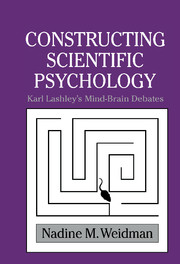Book contents
- Frontmatter
- Contents
- Preface
- Acknowledgments
- List of abbreviations
- Introduction
- 1 Lashley and Jennings: The origins of a hereditarian
- 2 Lashley, Watson, and the meaning of behaviorism
- 3 The pursuit of a neutral science
- 4 Neuropsychology and hereditarianism
- 5 Psychobiology and Progressivism
- 6 Psychobiology and its discontents: The Lashley-Herrick debate
- 7 Hull and psychology as a social science
- 8 Intelligence testing and thinking machines: The Lashley-Hull debate
- 9 Pure psychology
- 10 Public science and private life
- 11 Genetics, race biology, and depoliticization
- Epilogue: Lashley and American neuropsychology
- Appendix: Archives holding Lashley material
- Bibliography
- Index
1 - Lashley and Jennings: The origins of a hereditarian
Published online by Cambridge University Press: 16 September 2009
- Frontmatter
- Contents
- Preface
- Acknowledgments
- List of abbreviations
- Introduction
- 1 Lashley and Jennings: The origins of a hereditarian
- 2 Lashley, Watson, and the meaning of behaviorism
- 3 The pursuit of a neutral science
- 4 Neuropsychology and hereditarianism
- 5 Psychobiology and Progressivism
- 6 Psychobiology and its discontents: The Lashley-Herrick debate
- 7 Hull and psychology as a social science
- 8 Intelligence testing and thinking machines: The Lashley-Hull debate
- 9 Pure psychology
- 10 Public science and private life
- 11 Genetics, race biology, and depoliticization
- Epilogue: Lashley and American neuropsychology
- Appendix: Archives holding Lashley material
- Bibliography
- Index
Summary
Prologue
In an obituary of his mentor, Frank Beach described the life and career of Karl Spencer Lashley as the embodiment of many contradictions. Lashley, Beach wrote, was a “[f]amous theorist who specialized in disproving theories, especially his own,” and an “[i]nspiring teacher who described all teaching as useless.” Perhaps the most astonishing of these ironies is that Lashley was an “[e]minent psychologist with no earned degree in psychology.” Indeed, Lashley received formal training neither in neurology nor in psychology, the sciences which became the foci of his mature work. Lashley himself noted:
My training has been atypical for psychologists. As an undergraduate I specialized in comparative histology; my master's thesis was in bacteriology and my doctor's in genetics. … I did not choose psychology as a career until two years after the Ph.D. I never attended a course in physiology or neurology, which have become my major interests.
For Beach and the historians who have followed him, the problem has been to understand adequately how Lashley became renowned in fields for which he had little preparation. Most recently, in fact, Darryl Bruce has argued that Lashley's “shift” from his undergraduate work to his mature research occurred in several distinct steps, from bacteriology, to zoology and genetics, to comparative psychology, to learning, and finally to the neural basis of learning.
- Type
- Chapter
- Information
- Constructing Scientific PsychologyKarl Lashley's Mind-Brain Debates, pp. 18 - 31Publisher: Cambridge University PressPrint publication year: 1999
- 1
- Cited by

